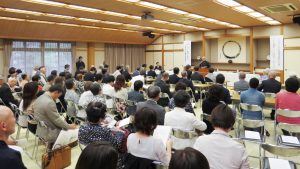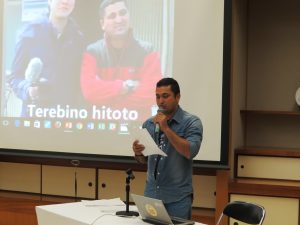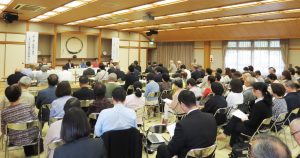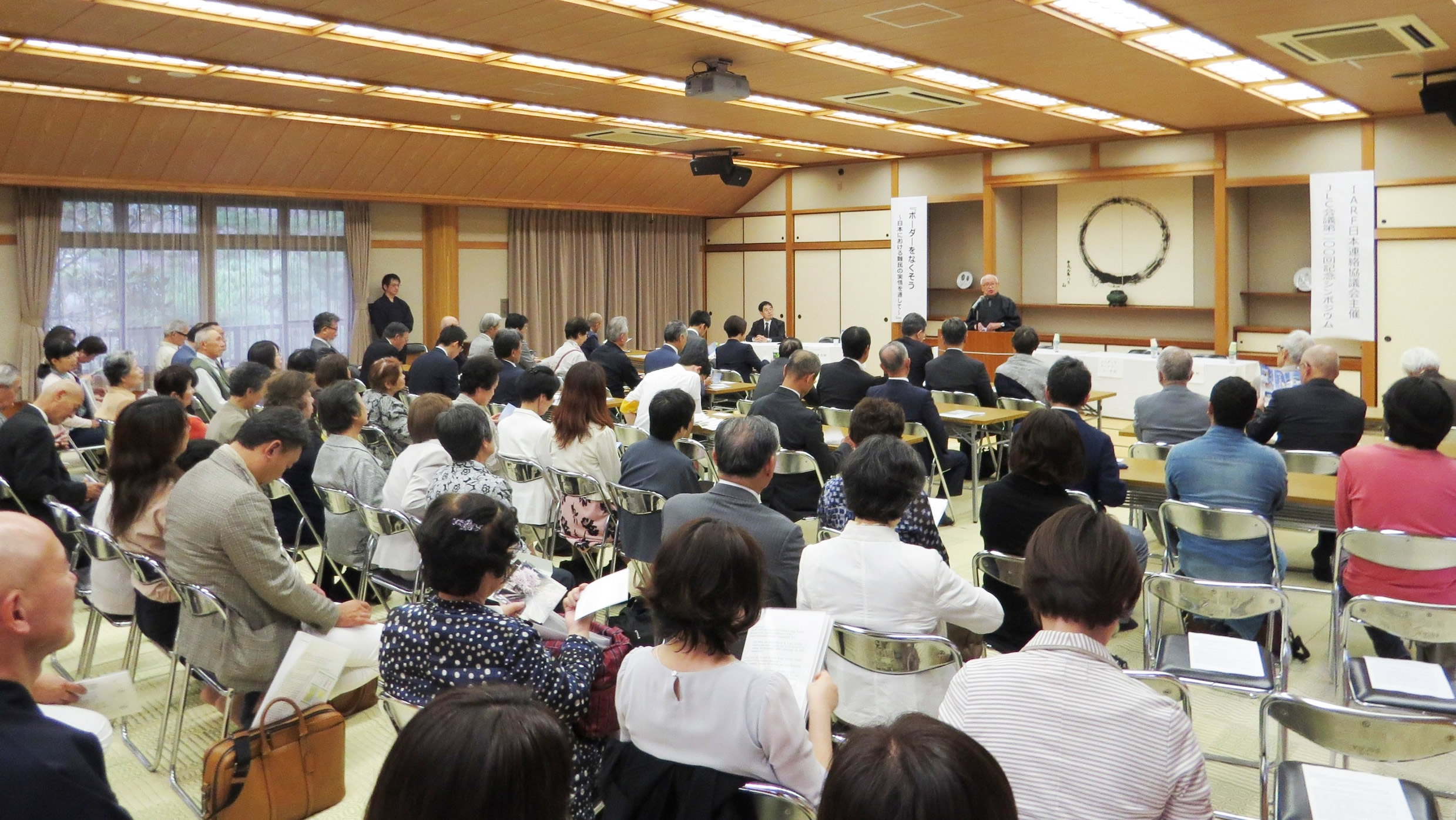Below you will find a report prepared by the Japan Liaison Committee of the IARF (you can read more about it here) from its most recent symposium.
Date: 9th October, 2016 14:00-17:00
Place: Hall of Soryo, Ittoen, Kyoto
Theme: Eliminate the Borders ~ Actual Situation of Refugees in Japan

A symposium in commemoration of the 200th JLC meeting took place at Ittoen, on a fine autumn afternoon. At 2.00pm, following welcome remarks by Rev. Toshifumi Takisawa of Mutsumi-kai, the MC of the day, Rev.Takeshi Nishida, the head of our host Ittoen, delivered an opening speech that gave a brief history of IARF and JLC. He enjoined the Symposium to be fruitful. Then, Ms.Peggy Kanada, Vice-President of IALRW, led the audience in an opening prayer. She offered a prayer for peace with the hope that refugees, and all victims of violence and social persecutions could go back eventually to their old homes, but meanwhile should be guaranteed basic human rights (including jobs and education) to maintain hopes for the future in their host countries.
Session 1 “Actual Situation of Refugees in Japan”
The Program consisted of two sessions.
In the first session, three speakers delivered presentations aimed at showing the present situation of refugees in Japan. The first speaker was Mr.Hiroaki Ishii, the Executive Director of Japan Association for Refugees (JAR). The second one was Mr.K.C.Deepak, a refugee from Nepal, accepted to residency in Japan. And the last was Mr.Eedak Mohammad Reza, who has escaped from Afghanistan and is seeking permission to stay.
1) Mr. Hiroaki Ishii
The first speaker was Mr.Hiroaki Ishii, the Executive Director of JAR. He gave a brief overview, especially about the legal system concerning refugees in Japan, using Power Point slides. He referred to different kinds of procedures/requirements a refugee must meet when arriving in Japan, what kind of assistance they need, and what JAR is doing for help them. He also mentioned that ‘nanmin’ (‘refugee’ in Japanese) is recently used not only in an original meaning of the word (a person who has escaped from their own country due to politics, religious persecution, war etc.) but also in a broader sense (any person confronting difficulties in living in their home countries, such as millions of people who cannot return to their residential area by public transportation’s trouble caused by natural disaster, or people who have no fixed address which was triggered by disemployment and family infighting, etc.). This larger conception of ‘nanmin’ makes it difficult to understand the real refugee issue.
2) Mr. K.C. Deepak

Mr.Deepak told the story how he came to Japan as a refugee, and how he lives in Japan, by explaining many pictures in fluent Japanese, which he learned after he came to Japan.
He and his family had worked for the King of Nepal, so they were persecuted by Maoist antigovernment forces. He escaped to Japan in 2004. For the first several years, he had difficulty finding food and shelter and it took 4 years of applying to be given refugee status by Immigration Authorities. His leg was hurt by torture from Maoists, but he was not able to access any medical care at hospitals in Japan at first because he could not get health insurance coverage without receiving refugee status. He would have had to pay prohibitively high medical expenses. Thanks to many people’s support, he found a place to live in Toyokawa, Aichi Prefecture. After he was given proper status, he was allowed to work and could go to any hospital using national health insurance (but has suffered permanent damage to his leg).
In 2015, a big earthquake hit Nepal and caused huge damage. He stood often in front of Toyokawa Station with his friends to ask for donations for the earthquake victims. Bonding over this, he made a community with other Nepali in the area.
The organization has grown to 82 members now, and they are committed to volunteer activities such as cleaning local areas, or aiding Japanese victims of disasters.
3) Mr. Eedak Mohammed Reza
Mr. Mohammed Reza was born an Afghan in a refugee camp in Iran, and got back to Afghanistan at age 10. Then he lost his parents at age 15 and had to take care of his 3 younger sisters. He worked as staff for the Japanese NGO called “Lala Association” which helps orphans in Afghanistan. This work led Taliban enforcers to label him ‘Kaffir’ (= one who has apostatized from Islam). They suddenly attacked and jailed him. Taliban allows only Muslims to exist in Afghanistan. When someone helps Kaffirs, they are deemed to be the same non Muslims. Mr.Reza emphasized that he is Muslim. However, he also said that all the religions are equal with every religion having moral precepts. Despite his Muslim faith, he was attacked and driven to leave his homeland in fear for his life.
When he arrived in Japan, he was really uncertain about his future. Although some people advised him that it would be very difficult to be given official refugee status in Japan, he felt he had no choice but to apply. It has been rejected already twice, but with nowhere else to go he has re-applied. He also confronted many difficulties of living in Japan: language, jobs, lodging and so on. But he said that he was lucky to be able to get support from the people around him. Now he studies at Doshisha University in Kyoto, and is preparing for further study in graduate school.
He emphasized that he never wanted to be a refugee. He thinks that getting refugee status is not the way to be happy for him, but he has no other options. Japan is a livable and peaceful place but it is not his own country. His sisters, of whom he has sole responsibility, cannot come to Japan. He eagerly desires to find a way to return his homeland and live with his family someday in the future.
Session 2 Panel Discussion: “Eliminate the Borders – Actual Surroundings of Refugees-“
After having a tea break, the Second session, a panel discussion themed on “Eliminate the Borders- Actual Situation of Refugees-“, started.
The Rev. Masahiro Nemoto, the special appointed executive for Inter-religious Cooperation of Rissho Kosei-kai, was invited as a panelist in addition to the three speakers of the first session. An energetic discussion was conducted by the moderator, Rev.Yoshinobu Miyake, Superior General of Konko Church of Izuo.
The Rev.Nemoto expressed his thoughts as following:
‘Through my longtime involvement to support refugees, I always consider “refugees” as “my family”. I want to help them the same as a family member living together. Accepting them as a family, what can “we (an organization)” or “I (individual)” do for them as necessary aid until the time comes when they will be able to go back to their homeland? I hope those gathered here today, will develop your thinking on this issue, and share it with others’.

After explaining the vague concern of the general public that some terrorists may enter into the country with refugees, Mr.Ishii pointed out the incorrect nonsense of this fear. It is much easier to enter the country as a tourist than as a refugee if a terrorist should want to come to Japan. Further, in Europe, “home-grown” terrorists are more serious problem than “visitors.” In Japan, it seems that our political leaders hesitate to make decisions to admit more refugees because of this tiny perceived risk. On the other hand, Japan can be considered a safe and hospitable country where people are kind to the others. He hopes to exploit this advantage to help refugees.
Rev. Yoshinobu Miyake, the moderator of the symposium, asked Mr.Deepak about the situation of communities of Nepali in Japan. Mr.Deepak answered that he does not know about other Nepali communities in Japan, but since he launched his own Nepali community organization in Toyokawa, where he lives, he can point to their responsible behavior and civic commitment to volunteer activities in their locality.
Rev.Miyake pointed out one big flaw of Japanese immigration rules about refugees, that is to say, that refugees who came to Japan due to the persecution only by their government, are acceptable but those who were threatened by rebel groups or guerrillas are not recognized as a refugees at the first application stage. Then he asked Mr.Reza about the current situation of Afghanistan. Mr.Reza replied, “It is too complex to describe in a short summary. There occurs every possible type of violence, conflicts and accidents, and these bad events continue. This complexity stems from the rough rapprochement process between the current Afghani government and the Taliban that ignores the responsibility of perpetrators and the bloodshed of the recent past.
In reacting the questions from the audience, discussion was ongoing about how can we break the cycle of hatred, or what kind of educational approach is required for the future generation.
In conclusion of the QandA session, Mr.Ishii expressed his gratitude to religious groups which have offered great support since Japan accepted refugees from Indochina 40 years ago, and his thoughts about more possible support from the private sector. For this, it is necessary to make the public understand the issue, and to make them feel that to assist refugees is our “responsibility”, no a “burden”. He also hopes religious people will foster an atmosphere that dissolves the negative views about refugees.
Mr.Reza said that he sometimes feels that some people look down on refugees, and it makes him very sad. Even if there are differences of languages, nationality or cultures, we have the same worth as a human. He appealed that they should know that anyone who is in such a situation is only a refugee because of unavoidable reasons.
Concluding the session with a big applause, Rev. Takisawa announced some information about the next IARF World Congress.
Then Rev. Kosuke Shiba, a priest of Tsubaki Grand Shrine, took the rostrum as the representative of IARF Japan chapter and led the audience in a closing prayer. It is ‘arigatai’ (thankful, literally ‘hard to be happening’) that we can live in a country at peace. Please join in a prayer for the peace, not only for Japan, but also for other countries.”
At the end, the Most Rev.Mitsuo Miyake, Chief Priest of Konko Chuch of Izuo, who gives a strong support to the IARF as vice president, delivered a closing address. He looked back on the 32 year path of JLC to come to this 200th regular meeting with deep feeling, and expressed his gratitude for the efforts of his predecessors. He directed us to think of people who have no chances to study, or even to lead lives safe from dangers. He expressed thanks for this opportunity to learn about refugees, and took a vow that the JLC and each member of us will contribute for mutual prosperity. Then he closed his speech with a word of thanks.
Just before the Rev. Takisawa wrapped up the session, the Rev. Nishida introduced Ittoen briefly for those who visited here for the first time. The program of a fruitful symposium was complete.
*Number of Participants: 93
Breakdown:
Rissho Kosei-kai: 24; Konko Church of Izuo: 20; Mutsumi-kai: 7; IARF Japan Chapter: 12; IALRW 1, Ittoen: 26, Press: 3.


